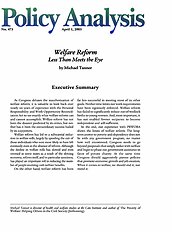As Congress debates the reauthorization of welfare reform, it is valuable to look back over nearly six years of experience with the Personal Responsibility and Work Opportunity Reconciliation Act to see exactly what welfare reform can and cannot accomplish. Welfare reform has not been the disaster predicted by its critics, but neither has it been the extraordinary success hailed by its supporters.
Welfare reform has led to a substantial reduction in welfare rolls, largely by speeding the exit of those individuals who were most likely to have left eventually even in the absence of reform. Although the decline in welfare rolls has slowed and even reversed in some states as a result of the slowing economy, reform itself, and in particular sanctions, has played an important roll in reducing the number of people receiving cash welfare benefits.
On the other hand, welfare reform has been far less successful in meeting most of its other goals. Neither time limits nor work requirements have been vigorously enforced. Welfare reform has failed to significantly reduce out-of-wedlock births to young women. And, most important, it has not enabled former recipients to become independent and self-sufficient.
In the end, our experience with PRWORA shows the limits of welfare reform. The long-term answer to poverty and dependency does not lie with any government program, no matter how well intentioned. Congress needs to go beyond proposals that simply tinker with welfare and begin to phase out government assistance in favor of private charity. At the same time Congress should aggressively pursue policies that promote economic growth and job creation. When it comes to welfare, we should end it, not mend it.

This work is licensed under a Creative Commons Attribution-NonCommercial-ShareAlike 4.0 International License.

